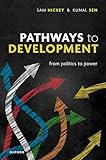Pathways to development : from politics to power / Sam Hickey, Kunal Sen.
Series: From politics to powerPublisher: New York : Oxford University Press, 2024Edition: 1Description: pages cmContent type:- text
- unmediated
- volume
- 9780198872566
| Item type | Current library | Status | Barcode | |
|---|---|---|---|---|
 Open Access Books - Publishers
Open Access Books - Publishers
|
National Law School | Available | OABP426 |
"Under what conditions do governments become committed to and capable of delivering development? How can these processes be conceptualised and researched? And what (if anything) can be done to 'get the politics right' for development? This book draws on a major comparative research effort to present new answers to the question of how does politics shapes development. It develops and applies a 'power domains' framework across multiple countries in the global South to uncover the political drivers of development across a wide range of policy areas, including economic growth, gender equity, health and education. We find that a country's pathway to development is shaped less by institutional type than by the nature of the politics and power relations that underpinned these institutions and which shape how they actually function in practice within different policy domains. Our comparative analysis reveals two alternative pathways to developmental outcomes, each of which is defined by different configurations of power. The first involves a dominant ruling coalition with a strong developmental vision that faces an existential threat from social forces; the second involves competitive settlements within which the short-term vision of ruling elites and the politicisation of the public bureaucracy are offset by the presence of strong and coherent coalitions within particular policy domains. We use these insights generate innovative, practical suggestions for policy actors seeking to promote inclusive development that are aligned to critical differences in political context, the importance of state capacity and the critical role played by reform coalitions"-- Provided by publisher.
There are no comments on this title.
